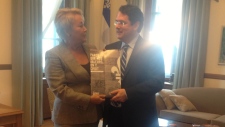 The PQ announced the creation of their coveted Charter of Quebec Values yesterday and was met by opposition across the board on the federal spectrum.
The PQ announced the creation of their coveted Charter of Quebec Values yesterday and was met by opposition across the board on the federal spectrum.On August 22, Liberal leader Justin Trudeau became the first federal politician to weigh in on the leaked idea of the charter and immediately denounced it.
“It worries me because our institutions, our state, must be neutral,” Trudeau said.
“Individuals have the right to their religion and to their freedom of expression. It worries me.”
NDP leader Thomas Mulcair was next to follow with a statement, one that wasn't nearly as decisive as Trudeau's.
“I’m not going to respond to trial balloons,” said Mulcair.
“When there is something concrete on the table, I’ll have no hesitation to respond to it.”
“When there is something concrete on the table, I’ll have no hesitation to respond to it.”
Yesterday, the Conservatives gave their first announcement regarding the Charter, announcing they would challenge it in the courts.
"If it's determined that a prospective law violates the constitutional protections to freedom of religion to which all Canadians are entitled, we will defend those rights vigorously," Multiculturalism Minister Jason Kenney said.
Consequently, Mulcair clarified his stance on the Charter.
"There's no expiry date on human rights. It's not a popularity contest, this for us is completely unacceptable and the NDP will be standing up foursquare against this project."
NDP MP Françoise Boivin said the Charter is worse than her initial impression of it.
"How can you differentiate between human beings?" she said.
"Why would I care if someone wears a turban? How does it affect me?"
She also noted the numerous exceptions including members of the National Assembly and private schools.
NDP MP Françoise Boivin said the Charter is worse than her initial impression of it.
"How can you differentiate between human beings?" she said.
"Why would I care if someone wears a turban? How does it affect me?"
She also noted the numerous exceptions including members of the National Assembly and private schools.
While campaigning in former Liberal MP, now Montreal Mayorial candidate, Denis Coderre's old riding of Borassa, Trudeau admitted differences in religion "tend to have a little more traction here in Quebec because of our strength of identity and the fact that we've managed to thrive in a mostly English North America." But he added, "Quebecers are better than this, and Madame Marois is going to find that out the hard way."
Trudeau then slammed Quebec Premier Pauline Marois for playing identity politics.
The Bloc Quebecois have been silent and haven't endorsed Marois's Charter.
“I do think we have to use whatever podiums we've been given, whatever voice we have, to speak out against injustice,” he said.
‘‘What we're looking at under this charter of secularism is intolerance. Plain and simple. We're not talking about government neutrality. We're actually physically saying to some children that because of the faith that you and your family follow, there are some jobs that you’re not eligible for.”
“What I’m saying today is look, whether or not you're a person who wears a turban or a hijab, if you’re uncomfortable living in a society that says people who wear turbans or hijabs should be excluded from certain jobs, come here. We're happy to have you,” he said.
In the meantime, Quebec political parties will soon debate the proposed charter in the National Assembly where the Liberals, Coalition Avenir Quebec and Quebec Solidaire vowed to defeat the charter. Last September, Marois's Parti Quebecois won a slim minority mandate with just under 1% of an advantage over the opposition Liberals. With less than 31% of the votes in the last election, it is clear the PQ proposal would be defeated if the other parties vote down the measure.
While early polls show a segment of the Quebec population is inclined to support the charter, it is noteworthy that the support comes from the outskirts of Montreal among Francophone mother-tongues who generally think poorly of immigrants in general.
Calgary Mayor Naheed Nenshi slammed Marois's Charter and offered Quebecers open arms to move west.
‘‘What we're looking at under this charter of secularism is intolerance. Plain and simple. We're not talking about government neutrality. We're actually physically saying to some children that because of the faith that you and your family follow, there are some jobs that you’re not eligible for.”
“What I’m saying today is look, whether or not you're a person who wears a turban or a hijab, if you’re uncomfortable living in a society that says people who wear turbans or hijabs should be excluded from certain jobs, come here. We're happy to have you,” he said.









No comments:
Post a Comment